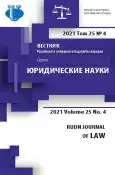Ensuring food security of indigenous peoples in Latin America by the UN food and agricultural organization (FAO)
- Authors: Rakhman A.Z.1
-
Affiliations:
- Peoples’ Friendship University of Russia (RUDN University)
- Issue: Vol 25, No 4 (2021)
- Pages: 855-871
- Section: INTERNATIONAL LAW. FOREIGN LAW
- URL: https://bakhtiniada.ru/2313-2337/article/view/327130
- DOI: https://doi.org/10.22363/2313-2337-2021-25-4-855-871
- ID: 327130
Cite item
Full Text
Abstract
The activities of the United Nations in the 21st century, as in the earlier period, are undoubtedly devoted to protection and promotion of human rights. It promotes the realization of fundamental human rights through specialized agencies in various fields taking in account concerns and needs of vulnerable groups of population, in particular indigenous peoples. The World Food and Agricultural Organization (FAO), in its turn, develops policies and implements strategies and programs to guarantee food security and the right to food to aboriginal people around the world, including in Latin America.
About the authors
Anita Z. Rakhman
Peoples’ Friendship University of Russia (RUDN University)
Author for correspondence.
Email: anita.rahman@mail.ru
ORCID iD: 0000-0003-0650-3103
Post-graduate student of the the department of International Law, Law Institute
6 Miklukho-Maklaya str., Moscow, 117198, Russian FederationReferences
- Abashidze, A.H. & Ananidze, F.R. (2011) International legal framework for the protection of the rights of indigenous peoples. Moscow, RUDN University Publ. (in Russian).
- Abashidze, A.H. & Ananidze, F.R. (1997) Legal status of minorities and indigenous peoples: international legal analysis. Moscow, RUDN University Publ. (in Russian).
- Angulo, R., Solano, A. & Tamayo, A. (2018) La pobreza rural en America Latina: Que dicen los indicadores sobre la población indigena y afrodescendiente de la region? Lima, Institute of Peruvian studies Publ. (in Spanish).
- Arellano, F. (2013) La entrada de Venezuela al Mercado Común del Sur (MERCOSUR): Implicaciones políticas y económicas. Caracas, Latin American Institute of Social Research Publ. (in Spanish).
- Bello, M. & Rangel, M. (2012) Equity and exclusion in Latin America and Caribbean: the case of Indigenous and Afro-descendant peoples. Santiago de Chile: CEPAL.
- Brubaker, R. (2014) Ethnicity without groups. Cambridge, Harvard University Press.
- Cabrero, F. (2015) Datos desagregados y “Buen Vivir”. Los aportes del PNUD junto con las organizaciones de los pueblos indígenas. Panamá, United Nations Development Program. (in Spanish).
- Diez, A. & Correa, N. (2016) Desarollo productívo y pobreza rural. Lima, Ministry of social inclusion development of Peru. (in Spanish).
- Eversole, R., McNeish, J.A. & Cimadamore, A. (2017) Indigenous peoples and poverty: an international perspective. N.Y., Zed Books Ltd.
- Fernández-Pacheco, J. (2016) Brechas en los derechos laborales de las mujeres en América Central. Proyecto «Incorporación de la dimensión de género en las políticas de erradicación de la pobreza y generación de empleo en América Latina». Washington, DC: International Food Policy Research Institute. (in Spanish).
- Jindra, M. (2016) The dilemma of equality and diversity. Current anthropology. 55 (3), 316-334.
- López-Hurtado, L.E., (2014) “Del dicho al hecho…”: Desfases crecientes entre políticas y prácticas en la educación intercultural bilingüe en América Latina en «Diversidad y Políticas Públicas». Santiago de Chile, Comisión Nacional Chilena de la UNESCO. (in Spanish).
- Magni, G. (2017) Indigenous knowledge and implications for the sustainable development agenda. European Journal of Education. 52 (4), 437-447.
- Murra, J. (2004) El Mundo Andino. Población, medio ambiente y economía [The Andean World. Population, environment and economy]. Lima: Institute of Peruvian studies. (in Spanish).
- Nopo, H., Chong, A. & Moro, A. (2011) Discriminación en América Latina: una perspectiva económica. Bogota, Mayol Ediciones. (in Spanish).
- Rangel, M. (2016) Politicas publicas para pueblos indigenas y afrodescendientes. Marco institutional en el Brasil, Colombia, el Ecuador y el Peru. Santiago de Chile, Políticas sociales. (in Spanish).
- Robles, C. (2014) Pueblos indígenas y programas de transferencias con corresponsabilidad: avances y desafíos desde un enfóque técnico [Indigenous peoples and transfer programs with co-responsibility: advances and challenges from a technical approach]. Santiago de Chile: CEPAL. (in Spanish).
- Sardan, O. & Piccoli, E. (2018) Cash transfers in context. An anthropological perspective. N.Y., Berghahn Books.
- Silveira, S. (2018) La dimensión de género y sus implicaciones en la relación entre juventud, trabajo y formación. Montevideo, Inter-American Center for the development of knowledge in vocational training. (in Spanish).
- Skoufias, E., Lunde, T. & Patrinos, H.A. (2015) Social networks among indigenous peoples in Latin America. Latin American research review. 45 (2), 49-67.
- Thornberry, Р. (2002) Indigenous peoples and human rights. Manchester, Manchester University Press.
- Valeeva, R.M. & Vagizova, R.G. (2007) International and domestic protection of human rights. Kazan, Kazan State University Publ. (in Russian).
Supplementary files









